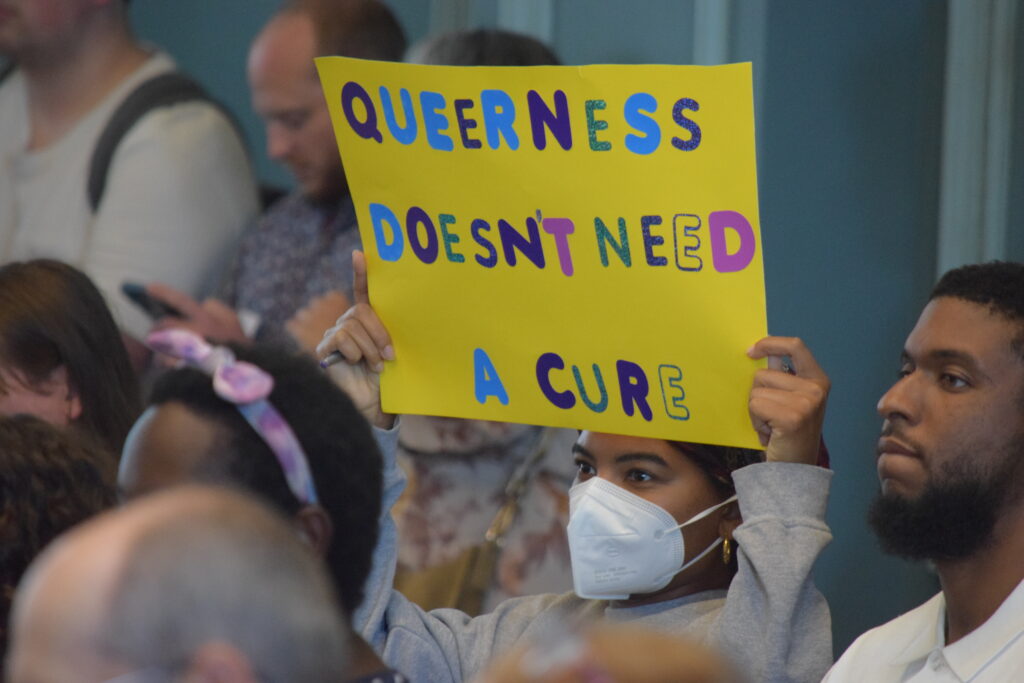LGBTQ+ advocate Cora Webb was among those who testified at city hall in Columbia, S.C., Tuesday, May 20, 2025, urging the city to maintain its ban on conversion therapy. (Photo by Jessica Holdman/SC Daily Gazette)
COLUMBIA — The Columbia City Council again deferred a vote to repeal an ordinance banning so-called conversion therapy Tuesday despite the looming threat of losing millions in state dollars.
The 2021 ordinance, which threatens a $500 fine for licensed therapists who attempt to change the sexual orientation or gender identity of an LGBTQ+ minor, has never been used, according to the mayor’s office. At stake for not repealing it is an estimated $3.7 million the city would otherwise receive in state funds.
A clause included in the state budget plan advanced last week would revoke state funding for any local government that prohibits so-called conversion therapy. Columbia is the only city in the state with such a rule on the books.
The city will move forward with its budgeting process under the assumption that the ordinance won’t be repealed before council members must pass a budget, City Manager Teresa Wilson said. When or whether the ordinance might come up for discussion again is unclear.
In every case reported to the city as potentially violating the ordinance, the so-called conversion therapy was being performed by a private religious group, to which the ban does not apply, Columbia Mayor Daniel Rickenmann said.
“There’s no teeth in the ordinance,” Rickenmann said. “It didn’t really do anything to protect.”
Even if the ordinance hasn’t been used, it’s an important show of support for the LGBTQ+ community, said Matthew Butler, LGBTQ advocacy strategist for the American Civil Liberties Union of South Carolina. It shows businesses, counselors and LGBTQ+ people that Columbia won’t stand for harmful practices, he said.
“The city did what the city could do under current law in this state,” Butler said. “It’s still worth having on the books.”
Some of the 20 advocates who spoke to the council for over an hour questioned whether there were zero reports because people weren’t able or comfortable coming forward to report abuse, or because the ordinance did what it was supposed to do and prevented therapists from the practice in the first place.
For Rickenmann, the question was not about the contents of the ordinance itself but about what the city stood to lose by keeping it in effect, he said.
With a general fund about 3% lower than last year’s, losing the money would leave a “gaping hole,” Wilson said. The money seems comparatively small in comparison with the approximately $444 million the city spent last year, but after some federal funds have run out, there’s no “wiggle room” to spare, she said.
“There’s no room in the general fund to replace $3.7 million, and I say that with all sincerity,” Wilson said.
Facing a deadline to pass a final budget July 1, the city will move forward with its backup plan to fill in the gaps using revenue from its tax on food and beverages, known as hospitality tax. Much of that $15 million has already been set aside for long-term projects, so the first cuts will likely come from the festivals and cultural institutions the money funds, Wilson said.
Any alternative would mean cutting services, such as park operations, public safety or road repairs, Rickenmann said.
“We want to make sure we protect the community,” Rickenmann said. “At the same time, we want to protect the whole community. So, that leaves us in a quandary for where we go, what we do and how we handle it.”
The issue came to the forefront for the city after Attorney General Alan Wilson sent a letter to the city last month threatening to take legal action unless the city repealed the ordinance. The rule likely violated a 2022 state law allowing only the state to regulate medical fields, as well as the U.S. Constitution’s First Amendment right to free speech, Wilson wrote.
Sen. Josh Kimbrell, a Spartanburg Republican who first questioned the law, proposed the change to the state budget.
A council member asked House Ways and Means Chairman Bruce Bannister to include the clause in the negotiated spending plan to drum up support for repealing a rule they felt was likely unconstitutional, Bannister said. He declined to name the council member, and Rickenmann denied Bannister’s comments, saying that while council members have had discussions with legislators, none asked for the change.
Rickenmann and advocates for repealing the ban blamed politicking as the reason the ordinance was thrust into the spotlight four years after it began. Kimbrell and Wilson have each said they’re considering a run for governor next year. The race has no official candidates yet.
“To be honest, I wish it had all gone away,” Rickenmann said of the issue. “But we are where we are today.”
Legislators are expected to return Wednesday to adopt the state budget for the coming fiscal year that negotiators agreed to last week.
Read the full article here


